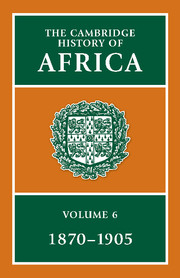Book contents
- Frontmatter
- Introduction
- 1 Africa on the Eve of Partition
- 2 The European Partition of Africa: Origins and Dynamics
- 3 North Africa
- 4 Western Africa, 1870–1886
- 5 Western Africa, 1886–1905
- 6 Western Equatorial Africa
- 7 Southern Africa, 1867–1886
- 8 Southern and Central Africa, 1886–1910
- 9 Portuguese Colonies and Madagascar
- 10 East Africa 1870–1905
- 11 The Nile Basin and the Eastern Horn, 1870–1908
- 12 The European Scramble and Conquest in African History
- Bibliographical Essays
- Bibliography
- Index
- Map 9 West Africa, c. 1870">
- Map 10 West Africa, c. 1905
- Map 13 The Congo Independent State
- Map 26 Ethiopia, the Nile Valley and the Horn in the era of Menelik II
- References
8 - Southern and Central Africa, 1886–1910
Published online by Cambridge University Press: 28 March 2008
- Frontmatter
- Introduction
- 1 Africa on the Eve of Partition
- 2 The European Partition of Africa: Origins and Dynamics
- 3 North Africa
- 4 Western Africa, 1870–1886
- 5 Western Africa, 1886–1905
- 6 Western Equatorial Africa
- 7 Southern Africa, 1867–1886
- 8 Southern and Central Africa, 1886–1910
- 9 Portuguese Colonies and Madagascar
- 10 East Africa 1870–1905
- 11 The Nile Basin and the Eastern Horn, 1870–1908
- 12 The European Scramble and Conquest in African History
- Bibliographical Essays
- Bibliography
- Index
- Map 9 West Africa, c. 1870">
- Map 10 West Africa, c. 1905
- Map 13 The Congo Independent State
- Map 26 Ethiopia, the Nile Valley and the Horn in the era of Menelik II
- References
Summary
If diamonds had begun the transformation of southern Africa, the industrialisation which followed the discovery of vast seams of underground gold on the Witwatersrand in 1886, followed by the renewed assertion of British supremacy in the interior of southern Africa, greatly accelerated the forces making for change over the entire region, and set the pace for much of the twentieth century. In the 1880s the sub-continent was still composed of a cluster of independent African kingdoms and Afrikaner republics, British colonies and protectorates; the huge new German acquisition of South West Africa was still largely unconquered. By 1910, with the political unification of the South African colonies, British ambitions of creating a southern African confederation seemed well on the way to fulfilment, while, to the north, British imperial frontiers stopped short only at Katanga and Tanganyika. All over southern African the annexation of African polities meant the establishment of colonial states, with government departments and courts, alien soldiers and policemen. By 1910 railroad arteries, often built at enormous human cost, connected the coast with mining centres as far afield as Bwana Mkubwa and Elisabethville (Lubumbashi), opening up new markets and releasing new sources of labour. Boundaries had been drawn which were to last beyond the colonial period, and it was accepted by the colonial rulers that the Zambezi was to be the boundary between the ‘white south’ and the ‘tropical dependencies’ of east and central Africa, although British Central Africa uneasily straddled the divide.
Keywords
- Type
- Chapter
- Information
- The Cambridge History of Africa , pp. 422 - 492Publisher: Cambridge University PressPrint publication year: 1985
References
- 2
- Cited by

